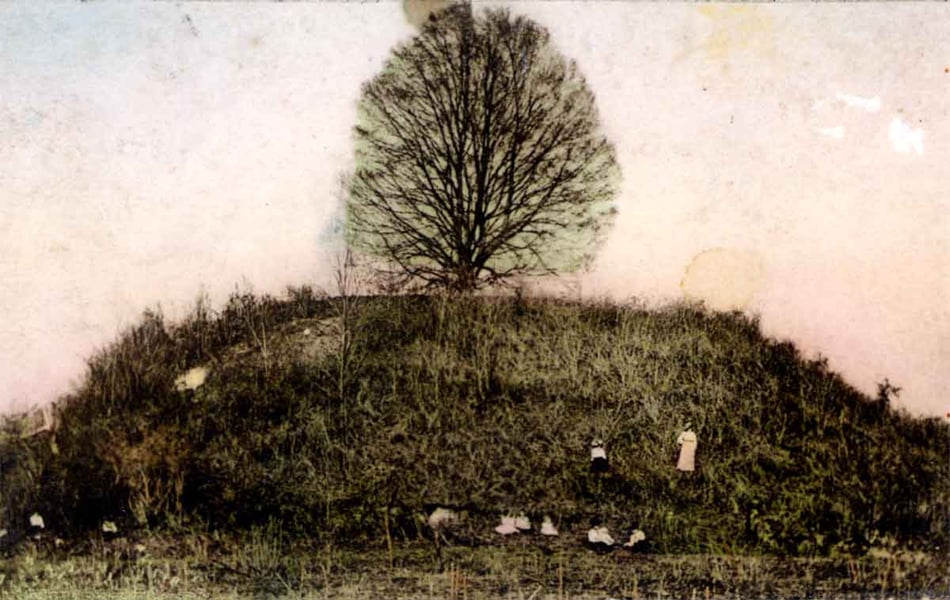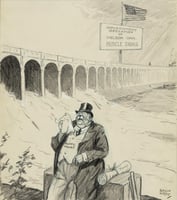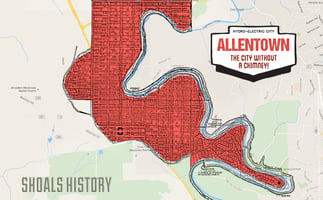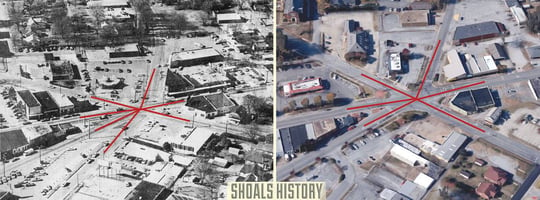This editorial cartoon was featured in the April 13, 1933 issue of the New York World-Telegram...
Waumanona, and the Florence Indian Mound

Waumanona, brave young chieftain,
Of the tribe of Chickamauga;
(So the legend hath descended)
Sought a bride among the Uchees:
Sought the maiden, Silver Moonbeam:
– She with eyes like sloes in twilight,
She with hair like braids of midnight –
Sought and brought her to his fireside.
Brought the beauteous Silver Moonbeam
To his wigwam in the valley;
To his ancient, royal wigwam;
To the wigwam of his fathers.
Gave her there the richest trappings,
Laced with gold and silver-threaded.
Gave her moccasins of doe-skin,
Bright with gems and fringed with bead-work.
Gave her downy cushioned couches,
Gave her bear skins without number,
Gave her all his vast possessions,
Gave her all his hearts devotion.
One month passed and then another,
– Golden months to Waumanona –
– Golden months to Silver Moonbeam –
One month passed and still another
Till twelve months had o’er them circled.
Then, upon a day in Autumn,
On a cruel day in Autumn,
Waumanona, back from hunting,
Saw no life about his wigwam,
Saw no smoke above it curling,
Heard no sound about the woodland,
Heard no sound within the wigwam.
Saw the wigwam doorway empty
With no smiling face to greet him.
Gripped by fear he crossed the threshold,
Calling unto Silver Moonbeam:
Called her thrice but heard no answer.
Then, within, he saw the Moonbeam,
Lying there upon her cushions,
Lying there so cold and silent,
With their still-born babe beside her.
Waumanona, brave young warrior,
Stood and saw her–anguished, voiceless;
Saw the death-dew on her forehead,
Saw her eyes, like sloes in twilight,
Open once, then close forever;
Saw the little still-borm papoose,
Saw it all, did Waumanona,
Saw it all and made no outcry,
But his heart was rent within him
And he fell down dead beside her.
From the hills and from the valley’s,
From the wilds of Alabama,
Came the Indian men and women,
Came the old squaw and the youngling—
Came to mourn for Waumanona.
Wept they one day, then another:
Wept, and wailed, and chanted dirges;
Wept the passing of their chieftain.
“Woe to us, unhappy people!
Woe to us whom mourn our leader!”
Thus lament until the evening,
Thus lament until the dawning;
With their wigwams left unguarded,
With their growing fields untended,
Mourning still for Waumanona.
“Let us honor him, our chieftain;”
Said the young men and the old men,
Said the squaws and dusky maidens,
“Let us seek the fairest landscape
In the bounds of Alabama:
Let us bear our hero thither,
Build a lofty mound above him,
Towering, like his great soul, sky-ward.
Let the mound to unborn ages
Tell of him, of Waumanona.
Tell of all his wondrous prowess,
Tell of all the tribes he conquered,
Tell of how each foe he vanquished
Yet, by grief, himself was vanquished.”
Through the dense and pathless forests,
Through the wilds of Alabama,
‘Cross the hills and over streamlets,
In their arms they brought their chieftain.
Brought him to the stately river,
To the changless, tireless river.
To the far-famed Tennessee.
Where the never-aging Sunset,
And the never-aging River
Plighted troth at the creation
When the young stars sang together.
And where still the blushing Sunset
–Constant ever to the River–
Stole at close of day to meet him,
With her burnished locks unbraided,
With her crimson robes ungirdled;
Lingering there upon his bosom
Will the twilight shades descended.
Where the bluff beyond the River
–Rising sheer above its waters–
With a grave and solemn wonder
Heard the River croon its love-song:
And the trees upon its summit
Clap their hands and bow in homage.
Here it was, beside this river
–Fairest spot in Alabama! –
That the Indians brought their chieftain.
Chieftain, bride and little papoose,
With their hands they bore them thither:
Laid them on a sward of blue-bells,
With the wild grass intermingled:
Dressed them in their richest garments,
Placed beside the chief his arrows,
‘Round him drew his belt of wampum,
Piled up shells to make more wampum,
Laid the pots and knives in order,
Brought the flesh of doe and pheasant,
Brought all foods in great abundance,
For his journey with his loved ones
To the land of the Great Spirit,
To the red man’s Land of Hunting,
To the red man’s great Hereafter.
Then they flung aside their weapons,
Cast their feathered head-dress from them,
Bared their heads and stripped their bodies,
Bent their backs and strained their muscles,
Bringing earth upon their shoulders,
Heaping up the mound above them.
Stern-faced squaws and bright-eyed maidens.
Little agile red-skinned striplings,
From the misty grey of dawning
To the dusky shades of twilight
Joined the strong men in their labor;
And the little toddling papoose
–All unmindful of its purpose–
Brought the soil in crumpled handsful.
One year, two years thus they labored,
Till a third year ‘round them cycled
And the great mound towered sky-ward,
And the Indian’s task was finished.
Gone is now the ancient red man,
Gone the wild, free life that knew him;
But the mound beside the river,
By the changless, deathless river,
By the storied Tennessee,
Guards the secrets of its people;
Pointing mutely from the present
To the ages long forgotten,
To a well-nigh vanished race.
And the bluff beyond the river
Though it saw the great mound builded,
Hides within its granite bosom,
In its pulseless granite bosom,
All it heard and all it witnessed;
Hides it there through all the ages
From the white man–the usurper.
And the softly gliding river,
Though it all was staged beside it,
Though it knew the Indian’s customs,
Mirrored oft’ his dusky features,
Slacked his thirst and laved his body,
Sped him swiftly on his journey
In his rude canoe of dug-out,
When we go to it with questions
Murmurs much but tells us–nothing.
Elizabeth Lansford Edwards.


